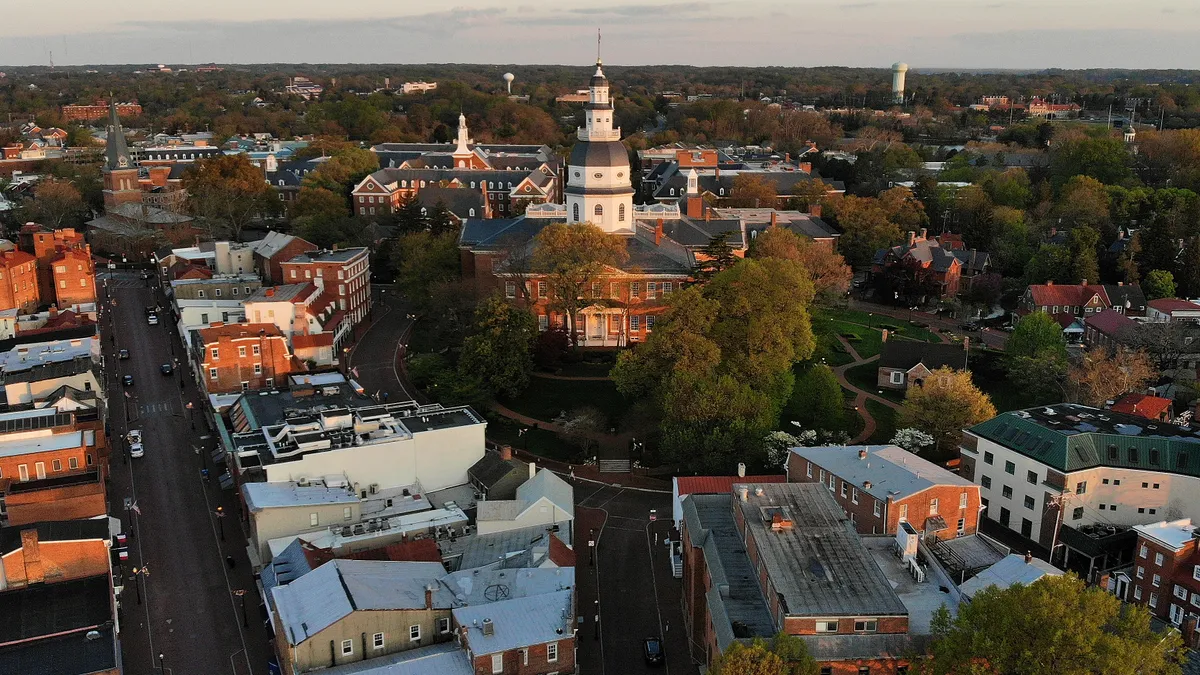Dive Brief:
- A bill introduced in the Maryland Senate in January would require the state to secure funding for greater organics recycling infrastructure, which may include the creation of a $2 statewide surcharge per ton of waste disposed.
- The bill comes after the Maryland Department of the Environment received a Solid Waste Infrastructure for Recycling grant from the U.S. EPA to analyze and identify gaps in organics recycling infrastructure and opportunities in the reuse and remanufacturing space.
- A lobbyist representing the Maryland-Delaware Solid Waste Association testified against the bill on Tuesday, saying the bill oversimplifies Maryland’s complex disposal system. Legislators expect a version of the bill to be filed in the House within days.
Dive Insight:
Maryland has passed a series of laws over the past three years expanding recycling and organics diversion. At the beginning of this year, a new requirement also kicked in requiring business that generate more than one ton of organic waste weekly to use a disposal alternative where the infrastructure exists.
Senate Bill 56 would set up a Reduce, Recycle, Remanufacture Fund for which the state must identify a funding mechanism. Funding sources could include federal or private grants, the state budget, the aforementioned surcharge or other modes, according to bill sponsor Sen. Katie Fry Hester. The funding would then be funneled to four programs: the Wasted Food Reduction and Diversion Grant Program, On-Farm Organics Diversion and Composting Grant Program, School Waste Reduction and Composting Program and the Circular Economy Incentive Program.
Those programs would support the creation of additional organics recycling infrastructure, something the state needs more of, advocates say. Last year, MDE received an EPA SWIFR grant to explore the state’s existing infrastructure and report back on areas of greatest need, providing a blueprint for future investment.
Hester’s bill would use that blueprint and build on prior legislation. The School Waste Reduction and Composting Program, for instance, was created through legislation in 2022 but requires the legislature to reappropriate funds every year. Environmental groups also supported a bill passed last year that exempted some compost permitting requirements for farms, but the cost to build such facilities remains a challenge, they say.
A coalition of groups, including the Maryland League of Conservation Votes, Clean Water Action and the Prince George's County Food Equity Council, signed a letter supporting the bill. They note that the state does not have a dedicated funding stream for organic waste reduction and diversion, and they commend the bill’s co-benefits, like reducing food insecurity and greenhouse gas emissions.
The bill would offer the greatest benefit to smaller facilities like community gardens and on-farm projects that may not be able to compete for grants in national programs, Emily Ranson, Chesapeake regional director at Clean Water Action, said in an interview. She also noted that finding a permanent funding solution for school programs is critical at a time when state budgets are shrinking from the expiration of federal Covid-era funding programs.
“We can't ask kids to lobby in Annapolis every year to get the grant programs renewed,” Ranson said. “This is a durable, important effort to make sure Maryland is investing in these projects.”
House Del. Regina Boyce is working on a companion version of the bill that may include some small changes, according to the letter signed by supporters. Those changes include widening the scope of projects covered to include organics recycling, rather than just composting, and allowing state agencies to access surcharge revenues while setting up grant programs.
In their opposition letter, the Maryland-Delaware Solid Waste Association, a local chapter of the National Waste & Recycling Association, noted that they approved of programs that would more narrowly support organics recycling infrastructure, particularly on-farm composting. But they objected to a surcharge that applies to all waste disposal.
"Any new solid waste disposal surcharge will most likely be passed on to the generators of solid waste, meaning nearly every household and business in Maryland would have higher charges for waste disposal. At a time when household budgets are being squeezed by inflation and other economic pressures, legislation resulting in higher waste disposal costs is not prudent," lobbyists for the MDSWA wrote in their testimony.
During the hearing on Tuesday, Hester said the $2 surcharge was a small percentage of an increase compared to the $54 average tipping fee. Pam Kasemeyer, a lobbyist for the industry group, agreed, but she said the complexity of determining who pays the surcharge would be challenging.
Kasemeyer also cited Howard County's opposition to a large wood waste composting facility as an obstacle she believed lawmakers should focus on instead, noting, "You may need large composting facilities to begin to deal with the volume of organic waste that we have."
The bill still must be approved by the Maryland Senate's Education, Energy, and the Environment Committee before getting a full vote in the chamber. The companion bill is expected by next week, after the filing deadline for the Maryland House expires.











